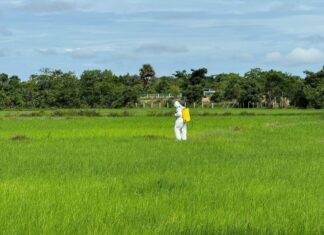Young people in Cambodia should look for internships as job vacancies have plunged 80 percent in a coronavirus-afflicted market, a U.N.-organized workshop heard on Saturday.
The online discussion, Youth and the Job Market During and Post Covid-19, was streamed on Facebook and had more than 3,000 views as of Saturday afternoon.
Ky Sereyvuth, a Labor Ministry adviser and statistical analyst at the governmental National Employment Agency (NEA), said job vacancies collected by the agency had cratered since the global outbreak of coronavirus.
“NEA had been collecting about 50,000 job vacancies per month, but now we collect only 10,000,” Sereyvuth said.
Much of the losses came in the garments sector, where a global slowdown has led to canceled orders from international brands. The tourism and service sectors were also severely affected, Sereyvuth said.
“We have known that the garment sector has problems, so the job vacancies are less,” he said.
The finance industry was less affected, while the Labor Ministry was working to provide training at factories, particularly in soft skills, he added.
“Now we have a lot of training in Phnom Penh and Sihanoukville factories,” Sereyvuth said.
Sou Socheata, the International Labor Organization’s (ILO) coordinator for the Decent Employment for Youth program, said 10.7 percent of young people told a recent ILO survey that they had switched from full-time work in the fourth quarter of last year to part-time work in the first quarter of 2020.
The trend suggested a reduction of 305 million job-hours among the population for the three-month period, Socheata said.
“We do not know how many youths are now unemployed, but according to the ILO survey, youths had worked full-time before, but now they work only part-time due to reduced demand,” she said.
The country’s informal sector could be struggling even worse than official figures suggest, Socheata added.
“The number of people affected is more than the government provides,” Socheata said. “Even though the government has good policies, those in the informal economy do not have specific data from reaching out to or locating them.”
She asked the government to continue to help workers, especially women and those in the informal sector. “It is our difficulty to provide for them,” she said.
Every year, about 160,000 young people enter Cambodia’s labor market looking for jobs, Socheata noted.
Pen Rany, assistant resident representative at the U.N. Development Program in Cambodia — which organized the discussion — said young people who are new in their jobs or still looking for their first are particularly vulnerable to a downturn in the job market.
“Before Covid-19, they were already struggling to find work, but when Covid-19 [hit], it became more difficult for them because some companies have suspended recruitment,” Rany said.
Rany said young people should turn to internships to at least get some experience that could help them in the future. Internships could also turn into paid jobs, she noted.
In a message, Labor Ministry spokesman Heng Sour told Newsroom Cambodia that the government had implemented several interventions and social assistance programs, such as creating community jobs for the unemployed, and helping poor families and migrant workers returning during the pandemic.
According to the World Bank, the coronavirus pandemic has hit the country’s main drivers of economic growth: tourism, manufacturing and construction. The three sectors together comprise more than 70 percent of the country’s growth and almost 40 percent of paid employment, it says, arguing that the crisis poses the greatest threat to Cambodia’s development in 30 years.












